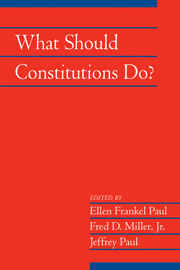Book contents
- Frontmatter
- Contents
- Introduction
- Acknowledgments
- Contributors
- What Are Constitutions, and What Should (and Can) They Do?
- Constitution and Fundamental Law: The Lesson of Classical Athens
- Contract, Covenant, Constitution
- Constitutionalism in the Age of Terror
- The Liberal Constitution and Foreign Affairs
- Do Constitutions Have a Point? Reflections on “Parchment Barriers” and Preambles
- The Origins of an Independent Judiciary in New York, 1621-1777
- Foot Voting, Political Ignorance, and Constitutional Design
- Pluralist Constitutionalism
- Deliberative Democracy and Constitutions
- The Constitution of Nondomination
- Can We Design an Optimal Constitution? Of Structural Ambiguity and Rights Clarity
- Index
Do Constitutions Have a Point? Reflections on “Parchment Barriers” and Preambles
Published online by Cambridge University Press: 05 June 2012
- Frontmatter
- Contents
- Introduction
- Acknowledgments
- Contributors
- What Are Constitutions, and What Should (and Can) They Do?
- Constitution and Fundamental Law: The Lesson of Classical Athens
- Contract, Covenant, Constitution
- Constitutionalism in the Age of Terror
- The Liberal Constitution and Foreign Affairs
- Do Constitutions Have a Point? Reflections on “Parchment Barriers” and Preambles
- The Origins of an Independent Judiciary in New York, 1621-1777
- Foot Voting, Political Ignorance, and Constitutional Design
- Pluralist Constitutionalism
- Deliberative Democracy and Constitutions
- The Constitution of Nondomination
- Can We Design an Optimal Constitution? Of Structural Ambiguity and Rights Clarity
- Index
Summary
INTRODUCTION: WHY WRITE DOWN CONSTITUTIONAL UNDERSTANDING?
A basic question facing any student of constitutions is what accounts for the modern prevalence of written constitutions. Political scientists since Aristotle, after all, have understood that societies invariably have collective political understandings that can be called “constitutions,” whether or not they are written down. What is the point of putting such understandings in writing? As we are often reminded, the United Kingdom–one of the world's great democracies, at least by conventional criteria–sustained itself over many centuries without such a constitution, even if one might well regard British membership in the European Union and its commitment to the European Convention on Human Rights as fatally weakening the conventional description of the country as lacking a written constitution. Moreover, that description is still accurate with regard to one of Britain's former colonies, New Zealand, which may have “superstatutes,” such as the New Zealand Bill of Rights Act, but still functions without a canonical constitution. The same is true of Israel. Still, it is obvious that at least since the loss in 1783 of one of the major parts of the British colonial empire–in terms of subsequent history, it is perhaps not unduly chauvinistic to say the major part of that empire–the trend has been very much in favor of written constitutions. For this, one may presume, the United States bears some significant responsibility; it had, by 1787, become the home of a plethora of written constitutions.
- Type
- Chapter
- Information
- What Should Constitutions Do? , pp. 150 - 178Publisher: Cambridge University PressPrint publication year: 2011
- 1
- Cited by



